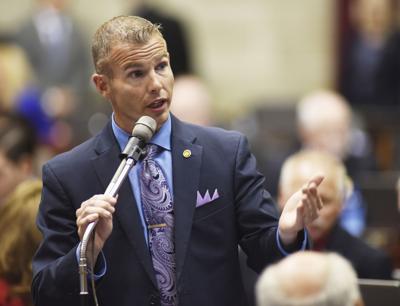
Rep. Rick Brattin, a Harrisonville Republican, is seen here debating on the floor of the Missouri House in 2016.
JEFFERSON CITY ŌĆö Members of the two-year-old Missouri Freedom Caucus really donŌĆÖt like tax credits.
The is known for its hard-right positions on immigration, voting access, transgender rights, guns and taxation.
While those remain among its top priorities, tax credit proposals ŌĆö which are common in the Legislature ŌĆö seem to stick in their craw.
And, even though their numbers are small ŌĆö just four of the 34 members of the Missouri Senate belong to the Freedom Caucus ŌĆö theyŌĆÖve shown theyŌĆÖve been able to block legislation in the past.
What differentiates this year from last is how frequently theyŌĆÖve allowed credits to go through, albeit with some hemming and hawing. In previous years, tax credits have often been dead on arrival in the Senate.
People are also reading…
The Senate passed a bill earlier this year that ended the planned expiration date for about a dozen tax credits. Leadership won over Freedom Caucus members by including a provision ending the expiration date on health care restrictions for transgender minors and barring transgender minors from playing in womenŌĆÖs sports.
After getting a 2033 expiration date added, the caucus allowed a tax credit to help revitalize downtown St. Louis go through. They voted no but didnŌĆÖt hold up a vote.
This week brought the first signs of a change in course.
On Wednesday, the Freedom Caucus blocked a vote on legislation providing a tax credit to make it more affordable for Missourians to get engineering degrees as the industry is facing workforce shortages.
If the Freedom Caucus returns to its old ways, it could be a death knell for bipartisan economic development work as tax credits are a common point of agreement between establishment Republicans and Democrats.
Both parties see tax credits as a way to help industries or groups in need.
Freedom Caucus members arenŌĆÖt angered because credits could lead to a loss in state revenue. Their frustration comes from a sense that the credits pick winners and losers, whereas broad tax cuts help everyone.
ŌĆ£Everybody should be able to partake in cost savings in the tax code, and thatŌĆÖs why I support removal of the income tax,ŌĆØ Sen. Rick Brattin, a Harrisonville Republican and caucus leader, said during Senate floor discussion earlier this year.
ŌĆ£Do I not punch the ticket because it (the legislation ending various credit expiration dates) has some agriculture tax credits in it and not protect my little girl from playing sports,ŌĆØ Brattin said at a recent town hall posted on Rumble.
ŌĆ£Those (transgender provisions) rise much higher than a dumb agriculture tax credit. I can probably file a bill next year to try and remove those from law.ŌĆØ
This year, even when Freedom Caucus members have only gotten a few concessions, theyŌĆÖve been content to vote no rather than burn the Senate down for a day.
Meanwhile, last year, former Sen. Bill Eigel, R-Weldon Spring, killed tax credits aimed at shrinking MissouriŌĆÖs child care access gap, one of former Gov. Mike ParsonŌĆÖs major priorities.
The legislation was sponsored by a Democrat and had wide support across the Republican caucus. It would have provided tax credits to parents paying for their childrenŌĆÖs child care, employers offering child care to employees and to child care providers.
The child care tax credit is an example of how tax credits mesh policy sensibilities of the Democrats and establishment Republicans. The 2024 Missouri Democratic Party platform says the party supports ŌĆ£establishing universal child care and paid maternity leave for both parents.ŌĆØ
Seeking to remedy the same issue, Republicans are more likely to establish credits to abate taxes for key areas rather than boost government spending.
The Freedom Caucus doesnŌĆÖt like either way. ┴±┴½╩ėŲĄ want to cut all or most taxes for everyone while paring back government entitlements.
ŌĆ£I think if we want to help everybody, we can do so far more effectively,ŌĆØ Eigel said of the 2024 proposal.
The Senate never passed the child care tax credit.
There have been some warning signs that the tides might be turning back toward EigelŌĆÖs direction instead of the steady course theyŌĆÖve maintained this year.
Similar child care tax credit legislation is being considered this session and is a priority of Gov. Mike Kehoe.
Sen. Adam Schnelting, a St. Charles Republican and Freedom Caucus members, said the proposal is a ŌĆ£tough one for meŌĆØ and that he is on the ŌĆ£same planeŌĆØ on the issue as Eigel.
The child care tax credit legislation is Sena Hous
Senate President Pro Tem Caleb Rowden, R-Columbia, gives a press conference on Thursday, Jan. 25, 2024, as Freedom Caucus members continued to hold up action. Video provided by the Senate media office; edited by Beth OŌĆÖMalley.












